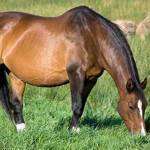Tips for Maintaining the Older Broodmare

Stop! If you own an aged broodmare that maintains her body condition beautifully through all stages of motherhood, this article is not for you. If, however, you care for one that is dragged down physically from the rigors of pregnancy and lactation, read on! Despite some misguided lore, it is possible for those grizzled, sunken backed doyennes of the broodmare band to be fleshy and in fine fettle during all phases of production. If you’re up to the task, you might be rewarded with a robust foal.
Consult knowledgeable professionals An aged mare sometimes requires an extra dash of diligence by caretakers and health-care professionals. For instance, instead of an annual dental examination, an older horse may need a checkup every six months by a dentist well-versed in maintaining the mouths of aged horses. Likewise, a veterinarian can determine if the mare is suffering from age-related conditions such as Cushing’s syndrome that might affect her fertility. Because horses are living longer than ever before, many veterinarians are becoming increasingly knowledgeable of geriatric medicine.
Monitor condition frequently Some producers take note of a mare’s body condition only during critical times of her breeding cycle: during breeding season, during the late-night vigils at foaling time, and through the beginning of lactation. Hands-on contact with the mare is more frequent at these times. At other times during the production cycle, such as when she is pronounced in foal and left to graze in late summer and fall, there might be less contact. Make a point to eyeball the aged mare regularly.
Observe behavior at feeding times As a mare ages, her place in the social hierarchy may shift dramatically. If younger mares are added to the herd, she might end up at the bottom of the pecking order. Therefore, it is important that she doesn’t have to fight her way to gain access to hay or grain. In large herds, she may need to be removed at feeding times and allowed to eat in a safe and comfortable area away from the nuisance of her herdmates.
Keep heat in Environmental conditions may sap a mare of vital energy stores. Shivering and other metabolic processes designed to keep a mare warm may divert valuable calories from maintenance of body weight. It is important to have a place in which a mare can seek refuge from the wind and chilling or freezing rain. A three-sided shed is all that may be needed. Be sure there’s plenty of room for all of the field’s occupants. If space is limited, the old mare may be the one driven away from the shelter.
Maximize coverage Being maintained in a stall for long periods may be too hard on an old mare’s arthritic joints, so allowing her as much turnout time as possible is advisable. When the weather is particularly frigid, you may consider covering her with a turnout blanket specifically designed to withstand the elements. If a mare is especially bony, rubbed areas may develop around the shoulders, withers, and hips. Be sure the blanket fits her well, and check for hairless areas daily. Modify the blanket as necessary to make certain of proper fit; some owners sew sheepskin pieces where rubbing occurs.
Choose specific concentrates An aged mare might perform extremely well when fed high-quality hay (perhaps straight alfalfa or an alfalfa-mix) and a concentrate formulated specifically for older horses. Such concentrates are labeled “senior feeds.” These formulations typically include several sources of energy such as fermentable fiber and fat in the form of soy hulls, beet pulp, and vegetable oils.
Oftentimes the digestive tract of an aged mare is less efficient than that of a younger mare. By supplying a concentrate that contains easily digestible forms of energy, you can ensure that she is receiving optimal calories.
Evaluate her ration If an aged mare has been placed in your care, and you’re unsure of how to feed her properly, go to your feed supplier and ask for help. There is usually a professional available who will be able to answer all of your questions.
Manage pain Senior horses may suffer from arthritis, gastric ulcers, navicular disease, and other conditions that produce chronic pain. Dealing with pain can impact appetite and cause horses to lose weight. A veterinarian can usually diagnose and treat the cause of chronic pain. Because some drugs affect the function of kidneys and digestive organs, a veterinarian’s guidance is suggested.








